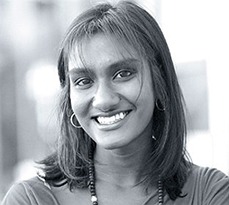When I started as a female founder of an ad tech company based in New York I had a lot of trouble raising venture capital… Less than 2% of all venture capital goes to women and 0.2% goes to women of colour and I found it very, very difficult.

On completing her Cambridge MBA Ashwini found herself in the middle of recession and initially sought work in the San Francisco area, US. Struggling to land anything in startups, she returned to New York and was hired by Buzzfeed, “Whom no one had ever heard of at the time”.
Now the CEO of the fund 22X, Ashwini is based in the Bushwick area of Brooklyn, New York, a former warehouse district dominated by the blockchain triangle – the largest concentration of blockchain companies anywhere in the world. In the summer of 2017 she was accepted into the accelerator 500 Startups, one of the biggest startup accelerators globally.
“At the time I was told by the organisation that ‘we think you are great and great at sales, but we think it is going to be very difficult for you to raise venture capital’. I was very frustrated.”
Ashwini was part of a cohort of 50 founders – about 36 companies – and she was becoming very interested in blockchain, cryptocurrency and ICOs (Initial Currency Offerings). It was very new at the time and she hadn’t been exposed to any of this burgeoning sector before. “There were these massive crowd sales with 200 to 300 million dollars being raised and it looked like an alternative way to raise capital for my own company,” she says.
“So, the founders in our cohort decided that we were going to do an ICO together, collectively. Instead of just trying to raise venture capital and competing in a market that was actually very small.
“We could go to a global group of retail investors that could receive crypto currency in exchange for that investment, and that currency could be liquid and tradeable.”
This was a very novel idea at the time: essentially the founders were saying ‘we are going to create a venture fund, we are going to tokenise that venture fund, create a cryptocurrency from it and we are going to use the money to invest in ourselves’.
“It was a lot of work and took over a year to create, build, and then close the fund that was created. They managed to raise a lot of capital and create a whole new way for startups to get funding – and really try and disrupt a system that has a lot of flaws in it.
“Every industry is ripe for disruption. Venture capital has traditionally funded that disruption, and so it’s right that they are disrupted themselves!”
Cryptocurrency and blockchain
With this new way of working in the traditional venture capital sector with cryptocurrency, more democracy is created in a traditionally exclusive sector. The individual investor can take part and develop diversified investments without having to be a high net worth individual. “You can invest as little as US$1,000 and participate in our sale. There is a lot of beauty in the offering we put together – it was a very first of its kind.”
Ashwini talks about this growing sector and her entrepreneurial role in the 2018 TED talk on using blockchain to democratise access to capital.
“The challenges we faced were enormous. It took so long because most people thought we were crazy. Our 500 startups hated what we were doing, law firms didn’t want to work with us. Even a security token was very new at that time to the market.”
Ashwini goes on to explain that, “People were very taken aback that a group of founders would try and fund themselves. We were inventing it as we went along, so we didn’t know what to exactly put together and what to do.
“My biggest lesson from the Cambridge MBA was collaboration, to work as a team, to co-operate, and have a collaborative ethos.”
The project turned out to have the most interesting team dynamics of anything she’d ever done before. She explains, “A group of CEOS and companies came together to issue something brand new – essentially create a company from all their companies. We all had to agree.”
Female founders
“As a female founder, less than 2% of VC dollars goes to women, that is ridiculous.
“When I first went out to market I was told I was great but that I should come and work for them. This seemed a backhanded compliment as it suggests that they don’t see you as able to lead your own company. It infuriated me at the time – there is a lot of sexism in the industry.”
Ashwini sought a new way to raise finance, so she didn’t have to stand out alone as a woman and female founder in the marketplace. She stood alongside a group of companies and a larger group of founders that would then have a greater chance of getting the investment they sought.
“There has to be change.”
I've always felt that if the ship is deeply flawed and designed badly you need to build a new ship.
Venture Capital as a sector is designed to be exclusive and it is designed to be only invested in a few companies. “You have a huge problem when you are trying to use a system of exclusive investment to broaden capital displacement and investment into a broader group of people – there is a natural conflict there.
“There are now a wider number of solutions being applied across the industry, many of which are often focused on getting more women to become investors and creating programmes to support female founders and this is all good, but we do need to catch up to our male counterparts. Awareness itself is starting to create change.”


